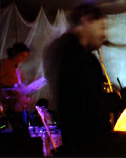
Comment
on this story
What:
Jackie-O Motherfucker with This Witch’s Seed and Double Muslims
When:
Saturday, Feb. 21, 9 p.m.
Where:
The Pilot Light
Cost:
$7
|
|

Going by an acronym, JOMF flirts with moderate international success
by John Sewell
Naming a rock band is usually a perilous proposition. Unlike jazz groups, who usually name the combo after a particular person or all the members, rock bands almost always choose some kind of poetic moniker. A bad name can sink a band, just because it leads people to make certain conclusions about the sound before even hearing the group. Choosing the wrong moniker can pigeonhole your band, or, worse yet, completely turn off potential fans.
On its album covers, the band name is listed merely as JOMF, and that’s probably for the best. Members of the multi-instrumentalist improv collective Jackie-O Motherfucker jumped off the high dive when they chose its name a decade ago. But, in spite of the name, the band has managed to garner legions of fans, both nationally and even moreso in several European markets.
“I can’t even tell what people think of the name anymore,” says JOMF figurehead Tom Greenwood. “At first, we picked the name as kind of a joke. And it really did its job by keeping people away from us, which is what we wanted. I mean, it really was the most repulsive band name ever.
“Since we’ve developed for almost 10 years in total obscurity, we’re now building up a following and getting noticed a bit, in some circles. We’re now just calling it JOMF because we’re tired of talking about the name.”
Formed in Portland, Ore., in 1994, JOMF was the brainchild of Tom Greenwood and Nester Bucket. The duo then traveled the United States in a series of tours during which different members would be employed for different areas of the country. JOMF had ensembles based in Portland, Baltimore and New York City.
Since its early, rough-hewn days, the band has evolved into a somewhat more cohesive unit based on the east coast. The last two years have seen a lot of exposure for the band including a long stint with Godspeed You! Black Emperor and several European excursions.
Asked if the improvisational nature of the band’s music is aided by the revolving door cast of musicians, Greenwood is rather tentative. “”We usually have around eight people in the group, and the music really suits having different people come in at different times,” says Greenwood. “We’ve also found that it’s easier not having to haul a lot of people around for great distances. We’ve really had a lot of different personalities come through the band.”
It’s not only the band’s name that will surely keep them off mainstream radio airwaves. The music is hard to grasp, doesn’t use the standard format of verse-chorus-bridge, and is often, at best, opaque. The evasive nature of the band’s sound seems ideal, because JOMF’s core members don’t seem interested in breaking out of the underground, anyway.
“Well, we usually just call what we do folk or psychedelic music,” says Greenwood. “Sometimes people think of what we do as being jazz, it’s kind of a matter of the instrumentation of whichever particular group of musicians they might hear.
“Whenever we use a lot of saxophone, people tend to call it jazz, but then they’re comparing it to stuff like Mile’s Davis’ electric bands, and that wasn’t really jazz anyway,” Greenwood continues. “Usually, the musical thing is not that regimented. What the particular musicians might decide to play is more of a personality thing. Improvisation is like a 50/50 thing. We have some basic ideas about where we want the music to go, and then we let the other people give their input as well.
“We’ve had all kinds of people play with us through the years, and it’s usually a matter of how we get along personality-wise,” Greenwood continues. “We’ve had people with musical educations at Berkeley and we’ve had people that have never played an instrument at all.”
JOMF’s loose aggregation and revolving-door membership policy—the band has had around 40 members in its history—seems to suit Greenwood just fine. In fact, it’s probably part of a master plan: The plan being that there is no plan—just wait and see what happens.
“I don’t have a master plan, not at all,” says Greenwood. “This entire experience has been a total surprise to me. If you had told me five years ago that (the band’s success) would’ve happened, I would have just laughed at you.
“Really, the whole thing has just happened as a matter of perseverance. Of course, it’s been a bit of a hustle as well. We’re trying to hustle ourselves and—at the same time—to be people that can’t be hustled.”

February 19, 2004 • Vol. 14, No. 8
© 2004 Metro Pulse
|